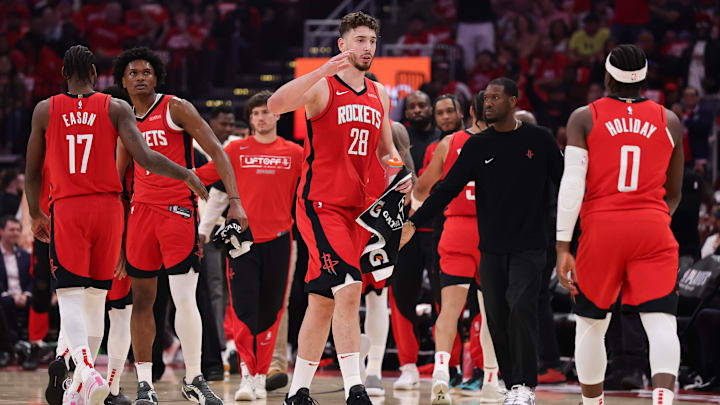When conversations about the Houston Rockets arise, the theme and undertones typically remain consistent. Praise is exuded for the team-first mentality that Houston plays with, as well as its dominant defensive capabilities, but skepticism over its offensive arsenal remain prominent.
Lost in those discussions is worthwhile praise for a player who has become the engine for what Houston has inexplicably accomplished: Alperen Sengun.
Sengun is in the midst of an All-Star season that should lead to All-NBA acclaim. At just 22 years of age, he's already become one of the most well-rounded big men south of Nikola Jokic, capable of contributing positive value in virtually every phase of the game.
That manifested in impressive 2024-25 regular season averages of 19.1 points, 10.3 rebounds, 3.4 offensive boards, 4.9 assists, 1.1 steals, and 0.8 blocks per game.
Sengun also forced opponents to shoot 1.3 percent worse when he was the primary defender, including a steep decline of 4.6 percent within six feet of the rim. Compounded by the fact that the Rockets outscored opponents by 7.6 points per 100 possessions when he was on the court and 0.4 when he wasn't, it's safe to call him a genuine star.
Some have been reluctant to give Sengun that credit, but if the Rockets' current postseason series is proof of anything, it's that Houston already has someone to build around.
Alperen Sengun is the complete player teams dream of building around
Sengun may not be the dominant scoring threat that Houston needs, but his well-rounded game is what's made their success possible. He elevates his teammates by setting screens, creating as a facilitator, and unselfishly approaching the way defenses collapse on him in the post.
The latter was proven when he ranked No. 8 among qualified players in screen assists per game at 7.9—a testament to how active he is without the ball in his hands.
Furthermore, Sengun ranked third amongst centers, trailing only Jokic and Domantas Sabonis, in points created via assists per game at 12.6. In other words: Combining points generated by his personal shots, passing, and screens, Sengun accounted for 39.6 points per game in 2024-25.
If that's not enough to impress you, try the fact that only Sabonis, Karl-Anthony Towns, Jokic, and Ivica Zubac scored more second-chance points than Sengun in 2024-25.
Whether he has the ball in his hands or not, Sengun is always active—and his actions tend to lead to points. That makes it all the more impressive that he ranked No. 5 in the NBA in points in the paint and No. 3 in points via post ups.
Scoring 19.1 points per game may not imply dominance, but Sengun's uncanny ability to always be involved is why the Rockets ranked in the 87th percentile in net rating when he was on the court.
The postseason has been troublesome for the Rockets, but Sengun continues to do his best to keep their dreams alive. Houston is outscoring the Golden State Warriors by 10.9 points per 100 possessions when he's on the court, but is being outscored by 20.1 points per 100 possessions when he isn't.
If ever there's been proof of a player's value to their team, it's the combination of film and advanced metrics that epitomize how Sengun is the engine that powers the Rockets' success.
